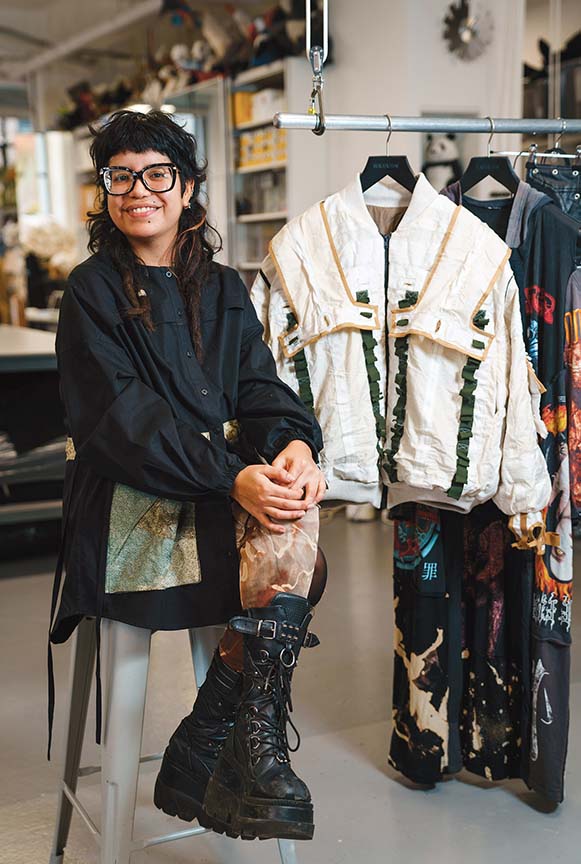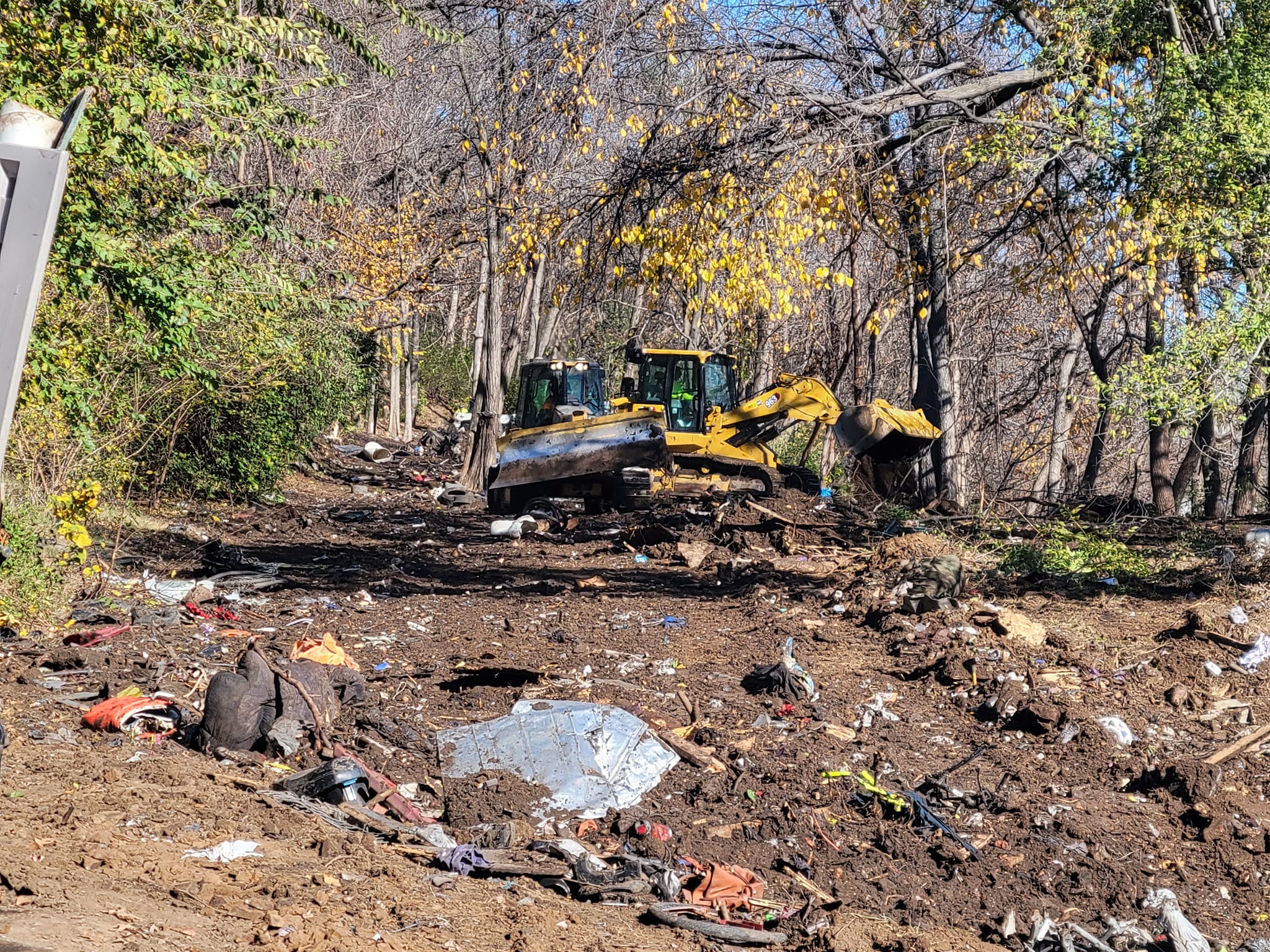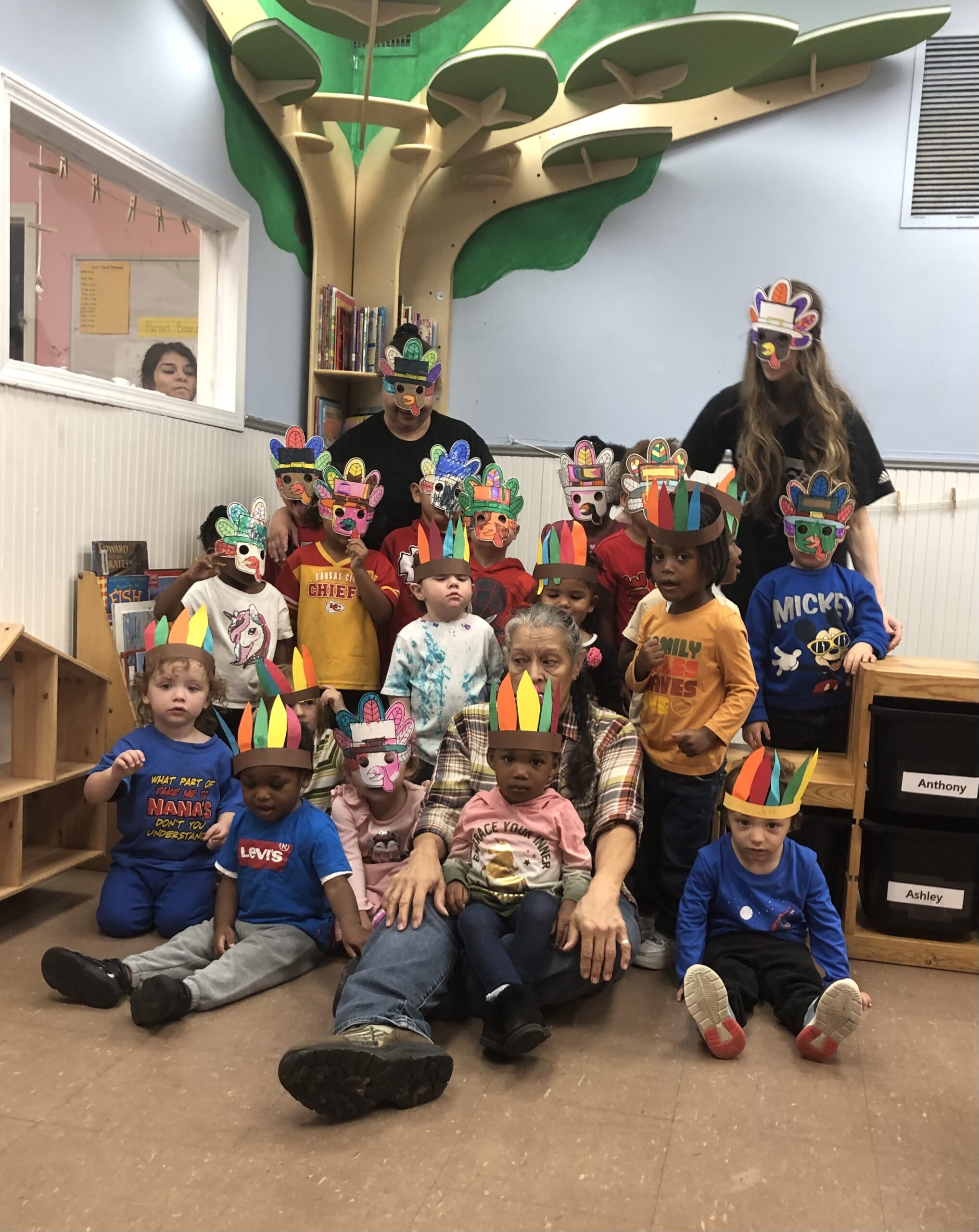
Abby Hoover
Managing Editor
The Sewing Labs of Kansas City, a nonprofit teaching the legacy of sewing for employment, entrepreneurship, and enrichment, is welcoming internationally known upcycler Francisca Gajardo of Iquique, Chile this month.
Gajardo travels the world to explore sustainable fashion and educate others. Through her Instagram account @y.a.n.g_ and her workshops, Gajardo has inspired a whole community of designers to adopt a sustainable approach to fashion.
Through the Young Leaders of the Americas Initiative, Gajardo has been awarded a four-week fellowship in Kansas City. As part of the enrichment she brings, she is offering workshops in the specific type of upcycling her community calls “Suprareciclaje.” The first, Experimental Recycling Workshop, a two-part class on Thursdays, June 16, and June 23, is a practicum on repurposing disused garments. Two separate workshops follow, Scrappy Explorations on June 28 and Simple Garment Reconstruction on June 30.
“The program matches you with a host organization that aligns with your vision, your philosophy and your work,” Gajardo said. “So basically, I teach people how to recycle garments and here in The Sewing Labs, they train people in sewing to find jobs and to empower themselves through sewing and stuff like that. Basically similar to what I do, but with recycling.”
By using a variety of textile interventions, the garments she produces and helps her students to make are whimsical, unusual and individual, and all bear the stamp of an indelible principle to “use what is there before you.”
The exchange program also provides for her to learn while she is here, and her current drive is for business planning, virtual teaching, and sustainability marketing.
As part of Columbus Park Third Friday Art Crawls, the Sewing Labs hosts Sewcials, where visitors are welcomed into the lab to learn about sewing.
“One of our founding principles was based around one of our founders, Lonnie Vanderslice, who would always say there are no throw-aways,” said Eileen Bobowski, Executive Director of The Sewing Labs. “She counseled people on substance abuse and recovery, and there are no throw-aways. So when they were conceiving the idea of The Sewing Labs, they had all these extra remnants from Weave Got You Covered. And they said, ‘We can’t put these into a landfill.’”
The founders did a lot of research, and decided they should be using the scraps from their upholstery business to teach people to sew. Eventually the program grew, and the Sewing Labs also hosts Fabric Grabs where community members can find remnants, sewing machines, and other supplies for free or a small cost so nothing goes to waste.
“I was at an event with a bunch of other nonprofits, talking about slow fashion and sustainability and upcycling and repurposing, and a gentleman from the Climate Council, Bob Grove, he’s like, ‘You’re the first person I’ve met in Kansas City at another nonprofit that’s like us,’” Bobowski said.
He ultimately connected The Sewing Labs with Young Leaders of the Americas.
For the community The Sewing Labs serves, full of immigrants and refugees, low income families, those lacking formal education, and with other barriers, learning to make their clothes last longer and learning a marketable skill is huge, Bobowski said.
“And there’s a big need for alterations, a lot of the dry cleaners used to do it and they dropped it,” Bobowski said. “We’re so lucky to have Miss Lee down here. She’s been in the room and we keep trying to convince her to come in and teach alterations because it’s a unique skill.”
Bobowski knows sewing is quickly becoming a lost art among younger generations. The Sewing Labs teaches simple mending workshops and how to use a machine to start, then a variety of skill specific classes.
“There’s a real importance to mending what we call generational clothing,” Bobowski said. “We have to stop this mentality of going to the big box stores and buying a $5 T-shirt that lasts six months. Used to be that the average person in the 1960s had 25 pieces of clothing that was worn routinely over and over again. There’s nothing wrong with that.”
Fashion trends have led to a mentality that people have to dress like their favorite celebrity, Bobowski said. She noted that probably more than 16% of people don’t know how to sew on a button and would rather pitch the clothing item altogether.
With the pandemic, she noticed a return to sewing – whether to stave off boredom, sew masks for protection, or mend well-worn clothes.
For Gajardo, a master’s degree in Sustainable Design and the extensive textile dumping grounds in her native land have led her to this path. She initially set out to be a fashion designer, and earned her bachelor’s degree in fashion design.
“Being from the north of Chile, you are immersed in this culture of buying American clothes,” Gajardo said.
Her hometown is a tax-free city, where many imports enter the country.
“We have, first, the biggest secondhand market there and as a consequence, the biggest textile landfills of the world,” Gajardo said. “Knowing this and knowing how the fashion industry works, after I finished my degree, I decided that I didn’t want to take part in the fast fashion industry.”
But after a while of reconstructing garments, she felt like even that wasn’t enough. That’s when she started doing workshops to teach people how to recycle their garments.
“First we need a way to analyze, ‘Why do we buy?’” Gajardo said. “Do we really need to buy during COVID times? Everything was closed, factories stopped producing, and you were in your house, and you were okay. Nothing happened to you because you weren’t buying.”
She encourages people to ask themselves what they need to fill inside their hearts. Then, she reminds them they don’t need to buy 50 cheap garments a year.“When you decide not to spend mindlessly on garments, and you decide maybe to buy one or two garments per year, and you actually build a wardrobe that represents yourself, that has a statement, has a philosophy, has something to say,” Gajardo said. “Is not saying, ‘I just buy because the market, the TV, and the system says to me that I have to buy. I buy because I consciously know who I am. I know what I’m saying when I wear my clothes. I know what it means to buy second hand. I know what it means to buy sustainable fashion.’”
Not buying fast fashion is the small part each person can do to keep clothes out of landfills, but it also cuts down on unfair labor practices. Gajardo said it’s not just about the trends, but the whole system.
“All the supply chain of fast fashion, it’s wrong from how they structure the materials, from how they process the materials, how they manufacture the garments, how they transport the goods, the marketing of the products, how they sell the products to other people, how the people use the products, how they dispose the products, everything is wrong,” Gajardo said. “Yes, trends are bad, trends are one of the worst things, but on the other hand, trends respond to society.”
She said people can respond to trends with creativity. For example, she doesn’t personally follow trends, but if she finds one she likes, she tries to find something similar secondhand or finds a similar fabric to repurpose and makes it herself.
“I make sure that it’s something that I’m really going to like that I’m really going to enjoy having in my closet for at least five to six years,” Gajardo said. “Always try to consider that what you’re adding is going to match this trousers and this skirt and this overall that you might have. When you feel bored of these garments, you can always swap with your friends. You can always resell it to your community, like do a yard sale. Or you can always rework it. Dye it, bleach it, paint it, embroider it. There’s so many things you can do with so many things and to express yourself creatively through your wardrobe. There’s nothing better as a therapy for you than doing that.”
Her goal over this month is to teach her workshops, which she has traveled the world doing.
“But now that I’m here, I want to absorb and learn as much as I can from The Sewing Labs community because one thing is to read what they do online or to hear what they do, but another thing is like actually talking to them and actually seeing the people that come, the impact that they really do in their lives, the social work,” Gajardo said. “I’m more than inspired by these people and more than amazed, I feel really lucky to be here.”
She’ll also help them with their social media, and they will teach her sewing skills.
“They’re going to teach me how to handle business and nonprofit businesses too, and they’re going to show me around the sustainable fashion world of Kansas City.”
Gajardo is working with the Climate Council on a documentary about the landfills in her hometown and how they link to North American consumerism. She’ll also work with Restoration School to do upcycling workshops for kids and an intergenerational co-design project, where they’re going to find fashion designers that would like to volunteer to help elderly people who have a wardrobe that they would like to upcycle but face barriers.
Gajardo taught in London during the London Design Festival last year, in Norway, Spain, and in Santiago whenever she makes it home.
Thinking of sustainable fashion in another decade, she hopes she can get funding to develop a project on zero waste reconstruction.
“I would like to train the big brands – because I know that it’s not just about pointing the finger and saying to them, ‘You’re doing it wrong.’ That doesn’t work. You need to work with them and find a solution for them – I have a solution that I’ve been putting in the oven for a few years. I just need to find the funds,” Gajardo said.
She wants to teach them how to use unsold, excess or damaged stock to deconstruct and make something new out of the fabric.
“My goal is to develop that project, turn it into a software, and train brands to do that,” Gajardo said. “So as many brands can start recycling there, there’s dead stock… They don’t take away from major natural resources. I’m planning to do travels around the world to find the roots of second hand clothes around the world, as well as the origin of clothes. So I’m planning some journeys around India, around South America, to try and to build this documentary series on the impact of fashioning communities.”
Gajardo is aware of brands like H&M, who have a conscious line, but say it’s trying to do something really bad in a slightly less bad way.
“The real sustainability is for no one to make clothes,” Gajardo said. “That’s the most radical thing you can do for the environment, and not just clothes, but artifacts, furniture, goods, electronics, everything. If you really want to save the planet, you need to stop.”
She saw the effect of factories being shut down during COVID, and said the planet became cold.
“For me, the solution would be to close H&M. No more H&M,” Gajardo said. “But then what happens with the communities that they’re giving jobs to, even though they’re not paying them good? They’re practically enslaving them. There are women across the world that need this to survive. It’s not that it’s as easy as to do what I’m saying, but personally, I don’t respect their conscious fashion, I think it is a joke.”
For Gajardo, visiting a landfill was like being at the end of the world. She’s been visiting street markets since she was a kid, and going to big warehouses with clothes hanging everywhere, piling up on the floor, and it always made her wonder, “Why do we keep making clothes?”
“I studied fashion and they trained us to do fashion in retail,” Gajardo said. “You’re not even like a fashion designer. You cannot create any good ideas that you have, it has to go through the engineers and the numbers. So basically you copy whatever comes from Europe, there’s no creative freedom.”
Knowing many people in her country are poor, she felt it dishonest to invent necessities and tell them to buy them just to feel accepted.
“Everything is so wrong and everything needs to change, but the cool thing is that it’s not only me that has this question, it’s not only me that’s working towards this,” Gajardo said. “Like what we’re doing here [at The Sewing Labs], social work is so important, creating a community like this is going to generate empathy for everyone that comes to sew. They’ll realize how hard it is to make a garment. They’re gonna see maybe when they buy a $3 shirt, they shouldn’t be doing it. It takes so much time to make a garment, it’s a whole artistic and spiritual process of creation.”
The Sewing Labs, at 526 Campbell St. in Columbus Park, has a calendar of classes at thesewinglabs.community.

















